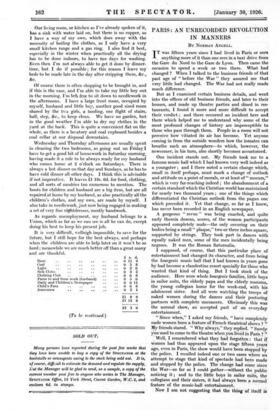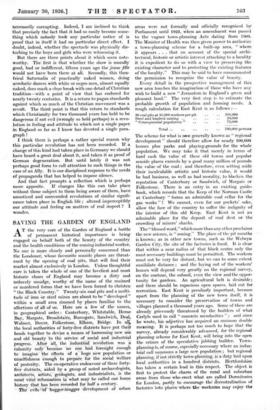PARIS: AN UNRECORDED REVOLUTION • IN MANNERS
BY NORMAN ANGELL.
iT was fifteen years since I had lived in Paris or seen -1-, anything more of it than one Sees in a taxi drive from the Gare du Nord to the Gare de Lyon. Then came the occasion to spend a .week or two there. What had changed ? When I talked to the business friends of that past age of "before the War " they assured me that very little had changed. The War had not really made much difference.
But as I examined certain business details, and went into the offices of old business friends, and later to their houses, and made up theatre parties and dined in res- taurants, I found it more and more difficult to accept their verdict ; and there occurred an incident here and there which helped me to understand why some of the most profound changes of history are imperceptible to those who pass through them. People in a room will not perceive how vitiated its air has become. Yet anyone coming in from the outside wonders how the inmates can breathe such an atmosphere—to which, however, the newcomer, in his turn, also shortly becomes accustomed.
One incident stands out. My friends took me to a famous music hall which I had known very well indeed as a youngster ; and I there noted a certain change which, small in itself perhaps, must mark a change of outlook and attitude on a point of morals, or at least of" moeurs," which is very far-reaching indeed ; the abandonment of a certain standard which the Christian world has maintained for nearly two thousand years ; one of the things which differentiated the Christian outlook from the pagan one which preceded it. Yet that change, so far as I know, has never been recorded in an English newspaper.
A gorgeous " revue " was being enacted, and quite early therein dozens, scores, of the women participants appeared completely nude—the only covering ' on their bodies being a small" plaque," two or three inches square, supported by strings. They took part in dances with equally naked men, some of the men incidentally being negroes. It was the Roman Saturnalia.
I supposed, of course, that this particular place of entertainment had changed its character, and from being the bourgeois music hall that I had known in years gone by had become a clandestine resort specially for those who wanted that kind of thing. But I took stock of the audience. Here were whole bourgeois families, little boys in sailor suits, the elderly papa and the elderly mamma, the young collegian home for the week-end, with his adolescent sister. And all were watching the troops of naked women during the dances and their posturing partners with complete unconcern. Obviously this was the normal show, an accepted part of an everyday entertainthent.
"Since when," I asked my friends, "have completely nude women been a feature of French theatrical shows ? My friends stared. "Why always," they replied. "Surely you used to come to the theatre when you lived in Paris ? " _ 'Well, I remembered what they had forgotten : that if women had thus appeared upon the stage fifteen years ago, even in Paris, the show would have been stopped by the police. I recalled indeed one or two cases where an attempt to stage that kind of spectacle had been made and stopped by the police. The change had come since the War---Lao far as I could gather—without the public noticing it ; and to the little boys in sailor suits, the collegians and their sisters, it had always been a normal feature of the music-hall entertainment.
Now I am not suggesting that the thing of itself is necessarily corrupting. Indeed, I am inclined to think that precisely the fact that it had so easily become some- thing which nobody took any particular notice of is proof that in itself it had no particular direct effect. I doubt, indeed, whether the spectacle was physically dis- turbing to the boys and girls who were witnessing it. '
But there are three points about it which seem note- worthy. The first is that whether the show is morally good, bad or indifferent, fifteen, years ago the jeune fille would not have been there at all. Secondly, this thea- trical Saturnalia of practically naked women, doing acrobatic dances with white or negro men, almost equally naked, does mark a clear break with one detail of Christian tradition—with a point of view that has endured for nearly twenty centuries. It is a return to pagan standards against which so much of the Christian movement was a revolt. The third point is that this return to standards which Christianity for two thousand years has held to be dangerous if not evil (wrongly so held perhaps) is a revo- lution in feeling and- attitude to which not A single paper in England so far as I know has devoted a single para- graph !
I think there is perhaps a rather special reason why this particular revolution has not been recorded. If .a change of this kind had taken place in Germany we should have heard a great deal about it, and taken it as proof of German degeneration. But until lately it was not perhaps good form to call attention to such things in the case of an Ally. It is our disciplined response to the needs of propaganda that has helped to impose silence.
And that fact prompts a reflection which is perhaps more apposite. If changes like this can take place without those subject to them being aware of them, have unnoticed and unrecorded revolutions of similar signifi- cance taken place in English life ; altered imperceptibly our attitude and feeling on matters of real import ? I wonder.



















































 Previous page
Previous page